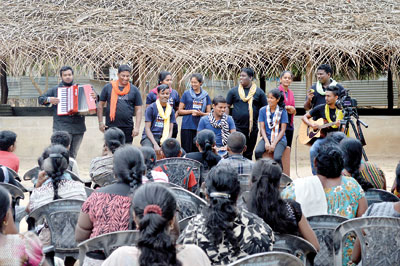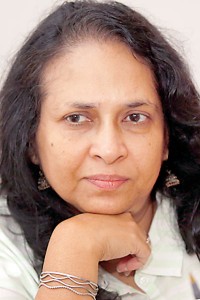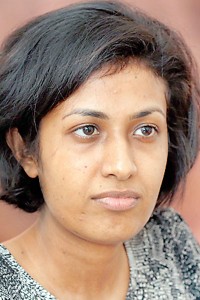News
Sexual bribery under the spotlight
It is shrouded in secrecy and even if there is a hint, it is quickly, conveniently and deftly swept under the carpet or adding insult to injury, trivialized.

Forum Theatre in areas such as Batticaloa, Mullaitivu and Kilinochchi, sending out a message on sexual bribery. (Pic courtesy of CEJ)
Nobody has wanted to or dared to lift the veil or the carpet and take a deep look.
Sexual bribery is the hush-hush subject – however, over the past four years, slowly and surely, sexual bribery has been brought to the forefront, not with mere allegations being thrown around but with solid evidence in the form of three studies, with the voices of the women victims which have not been heard before coming out loud and clear.
The studies are ‘Sexual Exploitation of Female Heads of Household in the North of Sri Lanka’; ‘Sexual Bribery of Military Widows in Sri Lanka’ in the Anuradhapura, Kurunegala and Galle districts; and ‘Shrouded in Secrecy – Sexual Bribery of Muslim Women in Post War Districts’.
The studies are a revelation on the sordid state of affairs that some women are forced to face at the hands of some grama niladharis, samurdhi officers, public health inspectors (PHIs), court officials, university lecturers, security service personnel, religious leaders, justices of the peace (JPs) and more.
The voices earlier unheard but now coming through are heart-rending…..“he said if I adjust a bit and fulfil his desires, he can put my name on the list (for a house); he stood close to me…..pulled me closer to him and said if I gave him what he wanted he would get the land re-assigned to me; come to a guest house tomorrow and be with me and I will find the court documents for you; when everyone went for lunch, the document officer held me close to him and said if I give him what he wants he will give me the file………”
These studies are the result of major efforts, amidst many challenges, of the Centre for Equality and Justice (CEJ), a women’s non-governmental organization.
“We started our work as FOKUS Women nearly six years ago and looked at women, peace and security, mainly in the northeast, north central and north western areas.
Once that programme was concluded, the CEJ was born in January this year to take this crucial work forward,” says CEJ’s Executive Director Shyamala Gomez.
Pointing out that the CEJ has the three strategies of — research for advocacy; awareness raising and capacity building; and law and policy reform, she explains that they are looking at war-affected women. There are two ways in which women have been affected by the war – direct and indirect, but it is not only in the northeast, north central or north western areas.

For audiences in Anuradhapura and Kurunegala, it was puppetry with Mahadenamutta as the central character that was used to point a finger at the ‘Kachcheri Mahattaya’ who resorts to sexual bribery. (Pic courtesy of CEJ)
What of the south where there are the mothers, wives and daughters of soldiers killed or disabled in the war? What of the plantation areas, where many displaced persons have been settled, she asks.
It is CEJ’s Project Coordinator Ando Anthappan who gives us the background when she says that in 2015 as part of FOKUS Women they carried out a project on the economic, social and cultural rights of female heads of households covering all communities in Puttalam, Anuradhapura and Ampara.
Inklings of sexual bribery came then, with a commitment to document it for stronger advocacy. Twenty-five cases, including 21 in connection with Tamil women and four Muslim women were documented from the north and the Puttalam area and more recently 10 more Muslim women from Batticaloa, Ampara, Trincomalee, Polonnaruwa and Puttalam. The CEJ also documented the case studies of 10 Sinhalese military widows in Anuradhapura, Kurunegala and Galle.
“This was the base for our push for change,” says Ms. Gomez, with Ms. Anthappan adding that along with it also came a huge awareness campaign to coax the women to break their silence.
Working closely with community-based organizations and sometimes also open-minded officials, to Anuradhapura, Kurunegala, Galle and the north they went using puppetry and Forum Theatre as tools respectively.
Mahadenamutta was the central character in Anuradhapura, Kurunegala and Galle and Forum Theatre was the medium in the north to give out gender sensitive messages with the ‘sexual bribe taker’ being portrayed as the ‘Kachcheri Mahattaya’. He depicted any public official to whom the women would have to seek out to get their work done and who turned out sometimes to be a person who solicited a sexual bribe or was a sexual bribe-taker.

CEJ’s Executive Director: Shyamala Gomez. Pix by M.A Pushpa Kumara.

CEJ’s Project Coordinator: Ando Anthappan
Under trees, in halls and in one instance even on a farm run by the military in the north, they spread the message that sexual bribery should be a “no, no”.
Enlightening women at grassroot level on sexual bribery, its many forms and that it was definitely a form of corruption was one pillar of the CEJ campaign. The other pillar was taking it to the higher echelons to convince the authorities of the necessity of policy and law reform.
“This meant taking a closer look at the Bribery Act and bringing about changes including in terminology, by creating a lobby group for anti-corruption against sexual gratification,” adds Ms. Gomez.
| What is sexual bribery? | |
| Sexual bribery can be defined as an “improper benefit” that is sexual in nature, demanded from a person (in our research, women who are heading their families) by men in positions of power, in exchange for a service or a favour, says Ms. Shyamala Gomez. Taking up sexual bribery and sexual exploitation, Ms. Ando Anthappan says sexual exploitation means solicitation of a sexual act in exchange for remuneration. It is carried out against one’s will or knowledge, including by means of a threat or use of force or other forms of coercion. It also involves abuse of power and one’s vulnerability or giving or receiving of payments/benefits to achieve the consent of a person having control over another person,” she says. Therefore, adds Ms. Gomez, sexual exploitation is the overarching concept under which sexual bribery is categorized. As such sexual bribery is a form of sexual exploitation. Some of the situations in which bribery can take a sexual form include:
|
| CEDAW member in Sri Lanka to focus on sexual exploitation | |
| Sexual exploitation will be the focus of discussions, a high profile member of the Committee on the Elimination of Discrimination against Women (CEDAW), Ismat Jahan, will have in Sri Lanka on a two-day visit on October 1 and 2 (tomorrow and Tuesday). CEDAW monitors implementation of the Convention on the Elimination of All Forms of Discrimination against Women and comprises 23 independent experts on women’s rights from around the world. Ms. Jahan from Bangladesh will meet independent commissions and lobby groups tomorrow and participate in a conference of stakeholders on Tuesday. |
| Lobbying bearing results | |
| The timing seems to be right to get sexual bribery into the National Anti-Corruption Action Plan being drafted currently, says Ms. Shyamala Gomez, pointing out that India has now come up with positive changes such as including “undue advantage” in their anti-corruption laws. The Centre for Equality and Justice (CEJ) is holding discussions with institutions such as the Law Commission and the Bribery Commission to include ‘sexual gratification’ as a form of bribery, she says, adding that the ongoing discussions are positive. It has also met the Sri Lanka Institute of Development Administration (SLIDA) to lobby for the introduction of a component on sexual bribery in the anti-corruption module in its training programmes for public officials, with a commendable outcome being SLIDA readily agreeing. The other policy reforms they are looking for is the introduction of a Code of Conduct on Sexual Bribery among public servants, with the CEJ going from north to south and east to west sharing its study findings while also getting an input from officials. The reaction has been that no one disagreed. But sometimes there was a tendency to blame the women for dressing inappropriately or to trivialize the whole issue, says Ms. Ando Anthappan, while there was also confusion of sexual bribery with other forms of gender based violence. A surprising and welcome suggestion from public officials had been that an Oath against Sexual Bribery — like the Hippocratic Oath taken by doctors when they pass out of medical school — should be taken by all of them. “We have also sounded out the Women’s Affairs Ministry which we hope would join hands with the Public Administration Ministry to send out a circular about zero tolerance of sexual bribery,” says Ms. Gomez. The simple thinking should be that you do not have to give up your body to get something done. Your body is yours and is not for sharing, for a duty an official has to perform, which is your right, she stresses. In the 45 case studies they have done, no one has been punished for sexual bribery. A few of the women had complained but it had been trivialized. So they had no faith or hope. Some women were so disgusted that they had said in despair, “we are tired of men”, points out Ms. Gomez. |

